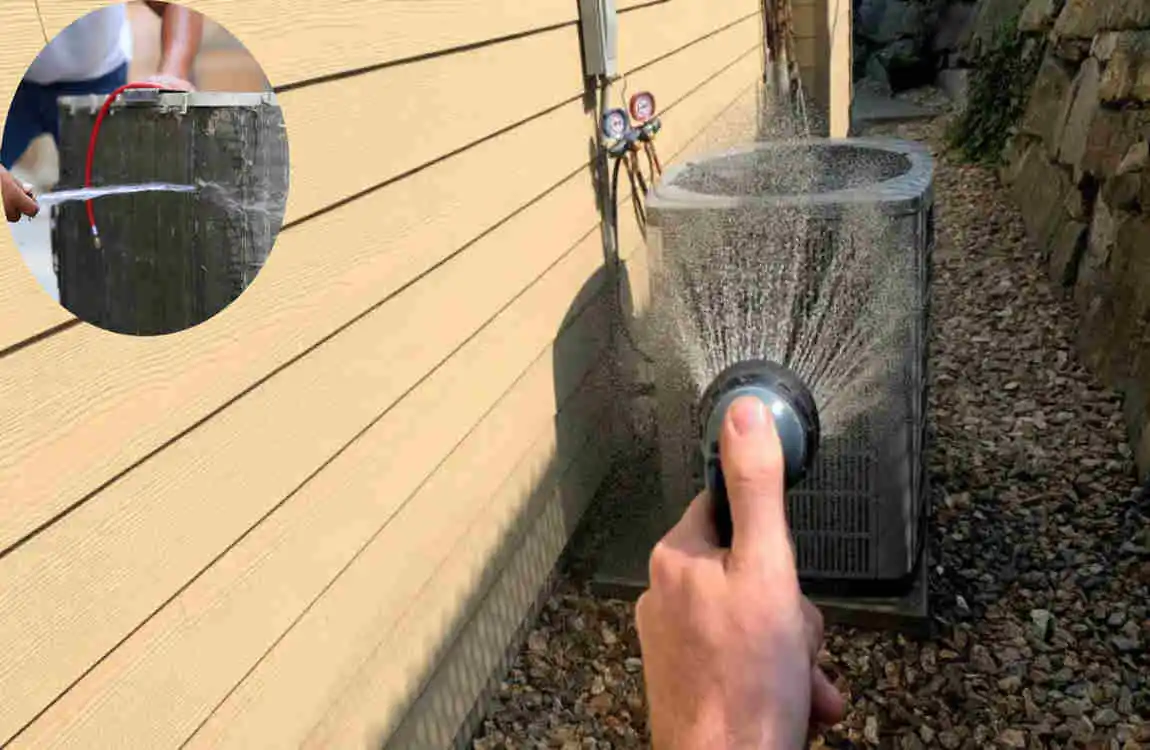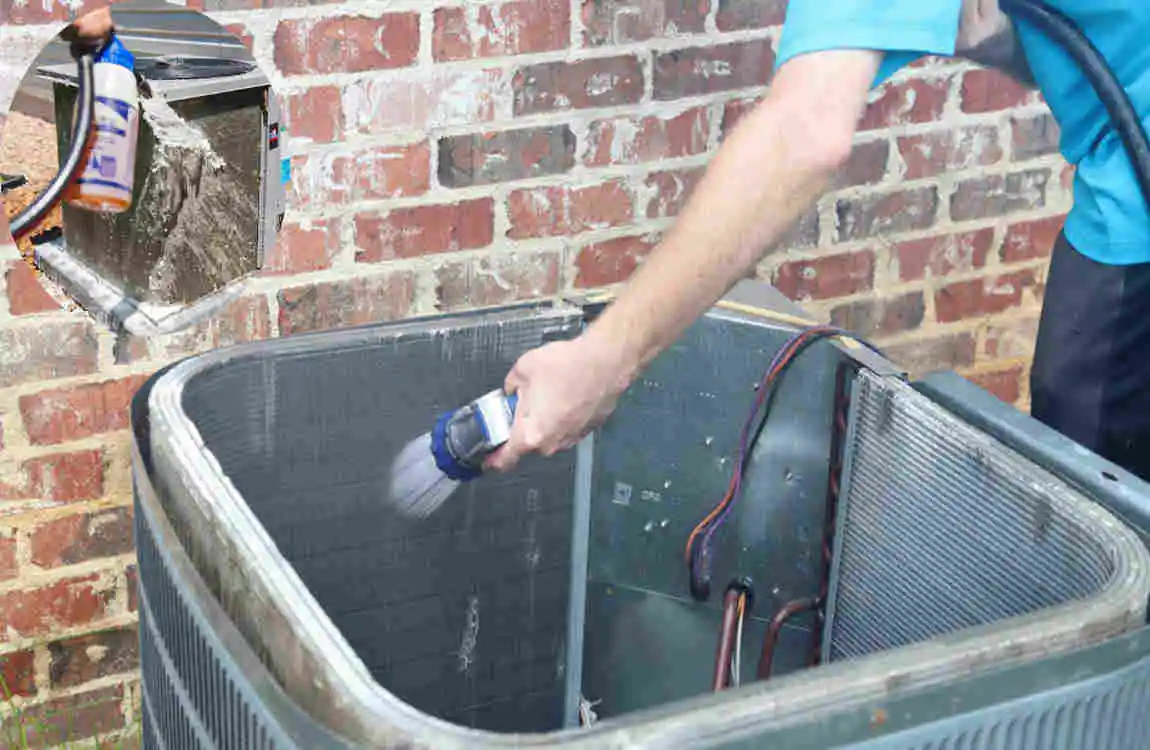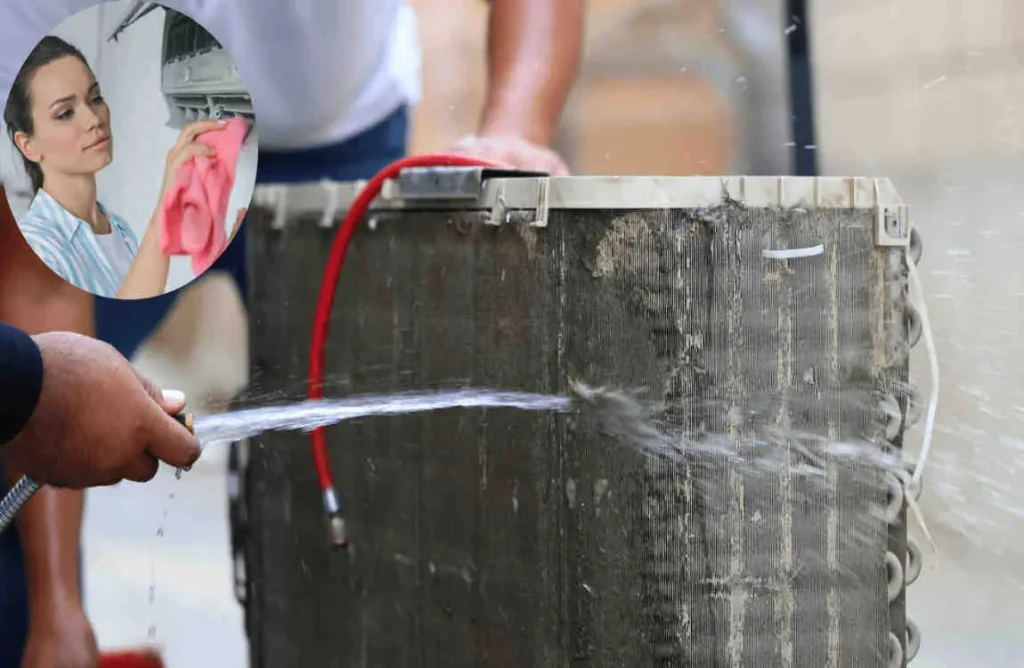To use water effectively to cool your AC condenser, spray it gently with a garden hose set to a gentle stream while the unit is running or turned off. This cools the condenser coil through water evaporation, washing away dirt and debris that block airflow and cause inefficiency. The cooler condenser reduces overheating risks, lowers energy consumption by helping the system operate more efficiently, and extends the lifespan of the AC unit. Make sure to clear debris around the unit before spraying and avoid high-pressure streams that can damage the fins. Allow the unit to dry naturally before restarting if turned off for house ac cleaning. This simple water spray maintenance enhances cooling performance, reduces energy consumption, and improves system durability.
Common Mistakes in Cooling AC Condensers

Cooling AC condensers can be tricky. Many people overlook the basics, which leads to inefficiencies.
One common mistake is neglecting proper airflow. Blocked vents or dirty filters hinder the cooling process. Ensuring clear pathways for air is essential.
Another frequent error involves exposure to direct sunlight. Condensers placed in full sun struggle to remain cool. Installing shades or relocating the unit can make a significant difference.
People often overlook regular maintenance, as well. Ignoring dirt and debris buildup hampers performance over time.
Using water without caution also poses problems. Excessive moisture can damage components, leading to costly repairs later on.
Relying solely on one method of cooling isn’t wise. Diversifying strategies ensures optimal efficiency across a range of varying conditions and temperatures.
Using Water as an Effective Cooling Method
Water can be a game-changer when it comes to cooling your AC condenser. This method harnesses the natural properties of water to enhance efficiency.
You may also read (how to check for asbestos in your 1986 home).
When you spray or mist water onto the condenser coils, it helps reduce their temperature. The evaporative effect allows heat to dissipate more effectively, leading to improved performance.
It’s important to remember that timing matters. Early morning or late evening applications are most effective when temperatures are cooler and humidity levels are manageable.
Remember also that consistent maintenance is essential for optimal results. Regularly check your unit’s cleanliness, as dirt and debris can hinder its effectiveness even with added moisture.
Steps to Effectively Use Water for Cooling Your AC Condenser

Start by ensuring your AC condenser is free from debris. Clear away leaves, dirt, and any obstructions that may hinder airflow. A clean surface allows water to work more effectively.
Next, choose the right time for cooling. Early morning or late evening are ideal when temperatures are lower. This helps maximize the benefits of using water.
Now it’s time to apply the water. Use a garden hose with a spray nozzle for an even distribution across the coils. Focus on soaking both the fins and the surrounding areas.
Monitor your system’s performance throughout this process. Pay attention to changes in temperature and energy usage after watering your condenser regularly.
Consider setting up a scheduled routine during peak summer months. Regular maintenance ensures optimal functionality while keeping your unit cool without excessive strain on its components.
Benefits of Using Water to Cool Your AC Condenser
Using water to cool your AC condenser brings several advantages. For one, it increases the overall efficiency of your air conditioning system. A cooler condenser allows the unit to operate at a lower pressure, improving its performance.
Water cooling can also enhance energy savings. By reducing the temperature around the condenser, you may notice a drop in electricity bills during hotter months. This straightforward approach can result in substantial cost savings over time.
Moreover, using water is environmentally friendly compared to other cooling methods that rely on chemicals or heavy machinery. It’s a sustainable option that aligns with eco-conscious practices while keeping your ac clean home comfortable and energy-efficient.
Alternative Ways to Cool Your AC Condenser
If you’re looking to cool your AC condenser without using water, there are several creative methods to consider. One practical approach is planting shade-giving trees or shrubs around the unit. This natural barrier can significantly block direct sunlight and reduce heat buildup.
Another option is to install an awning or pergola above your condenser. These structures provide overhead protection from the sun while allowing airflow, keeping the unit cooler during scorching days.
Also, explore reflective insulation wraps explicitly designed for condensers. These materials deflect sunlight and help maintain lower temperatures.
Regular maintenance plays a crucial role in efficiency. Keeping the coils clean and ensuring proper airflow can drastically improve performance on hot days, regardless of the external cooling methods you employ.
You may also read (5 reasons your house smells like cinnamon).
